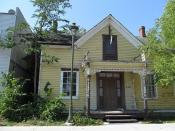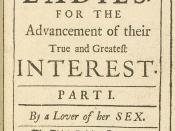Women writers of the seventeenth and eighteenth centuries faced many difficulties in writing and publishing their work, in a world where women were seen to be the intellectual and moral inferiors of men. However, several women writers of this time period both implicitly and explicitly criticized the institutions that bound them: class, marriage, social conventions and religion. In their writings, Mary Astell, Mary Carleton and Lady Mary Wortley Montagu find ways in which to challenge the authority of the patriarchal society, and much of their criticisms are shared, although the manner in which they construct their arguments differ. To varying degrees, these writers acknowledge the social conventions they are working within and maintain the necessity of them, while at the same time arguing for a better social position.
Mary Astell's "Some Reflections Upon Marriage" seems intended mainly for a male audience, as she often refers to women as "they", siding herself with men in an intellectual companionship.
In the excerpt of her essay found in The Longman Anthology, Astell cleverly aligns herself with men as a literate person, familiar with certain authorities herself: the Bible, Roman history, etc. At times, Astell logically attacks men's authority over their wives, and at other times, claims it is divinely indisputable. She appears to be "softening the blow" of her argument by occasionally stroking the male reader's ego and assuring him of his moral rightness: "Generous man has too much bravery, he is too just and too good to assault a defenseless enemy, and if he did inveigh against the women it was only to do them service" (Astell 2282). Passages like this are in direct opposition to other assertions Astell makes. For instance, she questions the authority of the husband over the wife and of men as governors, asking "{d}id the bare name...


